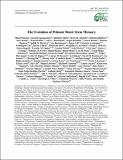Files in this item
The evolution of primate short-term memory
Item metadata
| dc.contributor.author | Many Primates | |
| dc.date.accessioned | 2022-12-15T08:30:08Z | |
| dc.date.available | 2022-12-15T08:30:08Z | |
| dc.date.issued | 2022-11-04 | |
| dc.identifier | 281792184 | |
| dc.identifier | 6508b984-4bfa-471a-b455-811f47f02917 | |
| dc.identifier.citation | Many Primates 2022 , ' The evolution of primate short-term memory ' , Animal Behavior and Cognition , vol. 9 , no. 4 , pp. 428-516 . https://doi.org/10.26451/abc.09.04.06.2022 | en |
| dc.identifier.issn | 2372-5052 | |
| dc.identifier.other | ORCID: /0000-0002-8597-8336/work/122216278 | |
| dc.identifier.other | ORCID: /0000-0003-2066-7892/work/122216363 | |
| dc.identifier.other | ORCID: /0000-0002-3867-3003/work/122216776 | |
| dc.identifier.other | ORCID: /0000-0003-4844-0673/work/126031802 | |
| dc.identifier.uri | https://hdl.handle.net/10023/26598 | |
| dc.description | * Correspondence should be addressed to Manuel Bohn (manyprimates@gmai l.com). | en |
| dc.description.abstract | Short-term memory is implicated in a range of cognitive abilities and is critical for understanding primate cognitive evolution. To investigate the effects of phylogeny, ecology and sociality on short-term memory, we tested the largest and most diverse primate sample to date (421 non-human primates across 41 species) in an experimental delayed-response task. Our results confirm previous findings that longer delays decrease memory performance across species and taxa. Our analyses demonstrate a considerable contribution of phylogeny over ecological and social factors on the distribution of short-term memory performance in primates; closely related species had more similar short-term memory abilities. Overall, individuals in the branch of Hominoidea performed better compared to Cercopithecoidea, who in turn performed above Platyrrhini and Strepsirrhini. Interdependencies between phylogeny and socioecology of a given species presented an obstacle to disentangling the effects of each of these factors on the evolution of short-term memory capacity. However, this study offers an important step forward in understanding the interspecies and individual variation in short-term memory ability by providing the first phylogenetic reconstruction of this trait’s evolutionary history. The dataset constitutes a unique resource for studying the evolution of primate cognition and the role of short-term memory in other cognitive abilities. | |
| dc.format.extent | 7060923 | |
| dc.language.iso | eng | |
| dc.relation.ispartof | Animal Behavior and Cognition | en |
| dc.subject | Cognitive evolution | en |
| dc.subject | Short-term memory | en |
| dc.subject | Primate cognition | en |
| dc.subject | Phylogenetic analysis | en |
| dc.subject | BF Psychology | en |
| dc.subject | DAS | en |
| dc.subject | MCC | en |
| dc.subject.lcc | BF | en |
| dc.title | The evolution of primate short-term memory | en |
| dc.type | Journal article | en |
| dc.contributor.institution | University of St Andrews. School of Psychology and Neuroscience | en |
| dc.contributor.institution | University of St Andrews. Institute of Behavioural and Neural Sciences | en |
| dc.contributor.institution | University of St Andrews. Centre for Social Learning & Cognitive Evolution | en |
| dc.contributor.institution | University of St Andrews. ‘Living Links to Human Evolution’ Research Centre | en |
| dc.identifier.doi | https://doi.org/10.26451/abc.09.04.06.2022 | |
| dc.description.status | Peer reviewed | en |
| dc.identifier.url | https://psyarxiv.com/5etnf/ | en |
| dc.identifier.url | https://www.animalbehaviorandcognition.org/article.php?id=1334 | en |
This item appears in the following Collection(s)
Items in the St Andrews Research Repository are protected by copyright, with all rights reserved, unless otherwise indicated.

